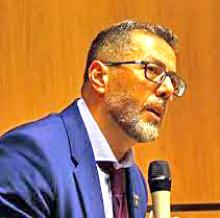You are here
Origins, objectives and war on BDS
Oct 03,2017 - Last updated at Oct 03,2017
The BDS movement (boycott, divestment and sanctions), was the outcome of several events that shaped the Palestinian national struggle and international solidarity with the Palestinian people following the second Intifada in 2000.
Building on a decades-long tradition of civil disobedience and popular resistance, and invigorated by growing international solidarity with the Palestinian struggle, as exhibited at the World Conference against Racism in Durban, South Africa in 2001, Palestinians moved into action.
In 2004, the Palestinian Campaign for the Academic and Cultural Boycott of Israel (PACBI) called for the boycott of Israeli government and academic institutions for their direct contributions to the military occupation and subjugation of the Palestinian people.
This was followed, in 2005, by a sweeping call for boycott, made by 170 Palestinian civil society organisations.
PACBI has served as a medium through which the Palestinian point of view is articulated and presented to international audiences through the use of media, academic and cultural platforms.
Because of its continued efforts and mobilisation since 2004, many universities, teachers’ unions, student groups and artists around the world endorsed BDS and spoke out in support of the movement.
In the absence of any international mechanism to end the Israeli occupation of Palestinian land, and because international law is not being enforced, as seen in dozens of unimplemented United Nations resolutions, BDS has grown to become a major platform to facilitate solidarity with the Palestinian people, apply pressure on and demand accountability from Israel and those who are funding or in any way enable Israel’s occupation of Palestine.
The call for BDS is made by Palestinian society. This is important, as no one has the right to represent the Palestinian struggle but Palestinians themselves.
However, the BDS movement itself — although centred on Palestinian priorities — is an inclusive global platform.
Grounded in humanistic values, BDS aims to court world public opinion and appeals to international and humanitarian law to bring peace and justice in Palestine and Israel.
The boycott movement was at the heart of the South African struggle that ultimately defeated apartheid in that country.
Roots of that movement in South Africa go back to the 1950s and 1960s, and even before. However, it was accelerated during the 1980s, which, ultimately, led to the collapse of the apartheid regime, in 1991.
There are many other precedents in history. Notable amongst them is the Boston Tea Party, protesting unfair taxation by the British parliament; the Montgomery Bus Boycott in 1955 (which ushered in the rise of the Civil Rights Movement led by Martin Luther King. Jr.) and the Salt March led by Mohandas Gandhi in 1930 (which initiated the civil disobedience campaign that was a major factor leading to India’s independence in 1947.)
All these are examples of popular movements using economic pressure to end the subjugation of one group by another. BDS is no different.
The BDS movement has three main demands: an end to Israel’s illegal occupation and colonisation of all Arab lands and dismantling the apartheid wall; recognition of the fundamental rights, including that of full equality, of Arab-Palestinian citizens of Israel; respect the rights of Palestinian refugees to return to their homes and properties, as stipulated in UN Resolution 194.
The BDS movement is the collective expression of the will and aspirations of the Palestinian people, who serve as the backbone of the popular, decentralised movement.
Additionally, BDS is supported by conscious people throughout the world, whether in their capacity as individuals or as representatives of religious or academic institutions, labour and professional unions, student groups and other organisations.
Main Israeli argument against BDS
By equating any criticism of Israel and its right-wing government with anti-Semitism, Israeli supporters readily accuse BDS of being an anti-Semitic movement.
For example, the pro-Israel Anti-Defamation League (ADL) bases such an accusation on the premise that “many individuals involved in BDS campaigns are driven by opposition to Israel’s very existence as a Jewish state”.
That is one of many such claims aimed at misrepresenting the BDS movement.
These claims are also meant to confuse and distract from the discussion at hand. Instead of engaging with internationally supported Palestinian demand for justice and freedom, the anti-BDS campaigners disengage from the conversation altogether by levying the accusation of anti-Semitism at their detractors.
But is BDS anti-Semitic?
Not in the least. In fact, quite the opposite. BDS opposes the supremacy of any racial group or the dominance of any religion over others.
As such, BDS challenges the Israeli legal system that privileges Jewish citizens and discriminates against Palestinian Muslims and Christians.
The Israeli government has sponsored several conferences aimed at developing a strategy to discredit BDS and to slow down its growth. It has also worked with its supporters across North America and Europe to lobby governments to condemn and outlaw BDS activities and the boycott of Israel in general.
These efforts culminated on March 23, 2017, with Senate bill S720, which, if passed in its current form, will make the boycott of Israel an illegal act punishable by imprisonment and a heavy fine.
Meanwhile, Israel has already enacted laws that ban foreign BDS supporters from entering the country. This applies to Jewish BDS supporters as well.
Achievements so far
Top Israeli government officials perceive BDS as their greatest threat. It is the first time in many years that this form of non-violent civil rights action has registered so profoundly on the agenda of Israel’s political elite.
The massive campaign under way to fight and discredit BDS is a testament to the power and resolve of the civil society-centred movement.
Palestinians are determined to someday achieve their own “South Africa moment”, when apartheid was vanquished under the dual pressure of resistance at home and the global boycott campaign.
Moreover, BDS is successfully pushing the conversation on Palestine away from the margins to the centre. It seems that the more Israel attempts to thwart boycott efforts the more opportunities BDS supporters have to engage the media and general public.
The accessibility of social media has proves fundamental to that strategy.
BDS is growing because it is both a moral and legal obligation to support oppressed people and pressure those who violate international law to end their unwarranted practices.
Writing from his cell in Birmingham jail, Martin Luther King Jr. wrote: “Injustice anywhere is a threat to justice everywhere.”
Guided by such moral principles, BDS offers a platform for anyone who wants to demonstrate solidarity with the Palestinian people in their 70-year-long struggle for freedom, justice and human rights.
The writer, www.ramzybaroud.net, is a journalist, author and editor of Palestine Chronicle. His forthcoming book is “The Last Earth: A Palestinian Story” (Pluto Press). He has a PhD in Palestine studies from the University of Exeter and is a non-resident scholar at Orfalea Centre for Global and International Studies, University of California.












